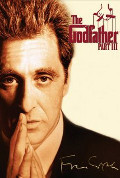
Directed by
Francis Ford Coppola
171 minutes
Rated M
Reviewed by
Bernard Hemingway

Godfather, The (Pt III)
The third instalment of The Godfather trilogy is generally regarded less highly than the first two. Indeed in some quarters it is reviled. The latter is a serious over-reaction even if there are too many obvious symmetries of staging and dialogue and one could well ask did we really need the film at all. Nevertheless even as a third instalment there is still enough here to beat out most instances of the genre.
Coppola and Puzo were struggling with Corleone fatigue and they do not manage to introduce much that is new to the forward motion of the narrative, which concerns Michael’s longed-for legitimisation of the family’s business interests, and the stuff that won audiences for the first two films, the gangland wars. The result is a hybrid of old-fashioned Sicilian rivalries and big business multinational shenanigans (whilst the Catholic Church had been a patsy in the first two editions, here at its higher echelons, it is an active player) and despite being stylistically consistent the film does not come together as convincingly as its predecessors.
There are other objective factors going against it – most of the original characters are gone and new characters are introduced, notably Andy Garcia, who is way too much of a pretty boy and, one suspects, possibly a mule for a fourth instalment, something which we can only hope never happens.
Whereas there were only two years between the first two films, sixteen years have elapsed between the second and third instalments and the most important aspect in those films' success, the hermetic atmosphere of the Corleone family, has gone. Everything that made the first two films - the strong characters and the close family environment - has been replaced by a kind of anonymous upper West Side Manhattan lifestyle and contrived re-workings of scenes from the earlier films (a good example is the scene involving Garcia cooking in his hide-out: he's got an industrial kitchen but who is he cooking for?). All attempts to regenerate this atmosphere with Cousin Vinnie, Aunt Connie and Michael’s adult children Anthony and Mary (well-played by Coppola’s daughter, Sophia who, very appropriately, had also been the baby being baptised in the first film) fail to convince. Pacino however, is still sensational as the Don, and if as a story the film does not manage to convince in the way that its forbears did, it is still wonderfully well-made, has the substantial weight of its two predecessors behind it and as a resolution of Michael’s story it is powerfully effective, ending with a devastating finale.
Want something different?





